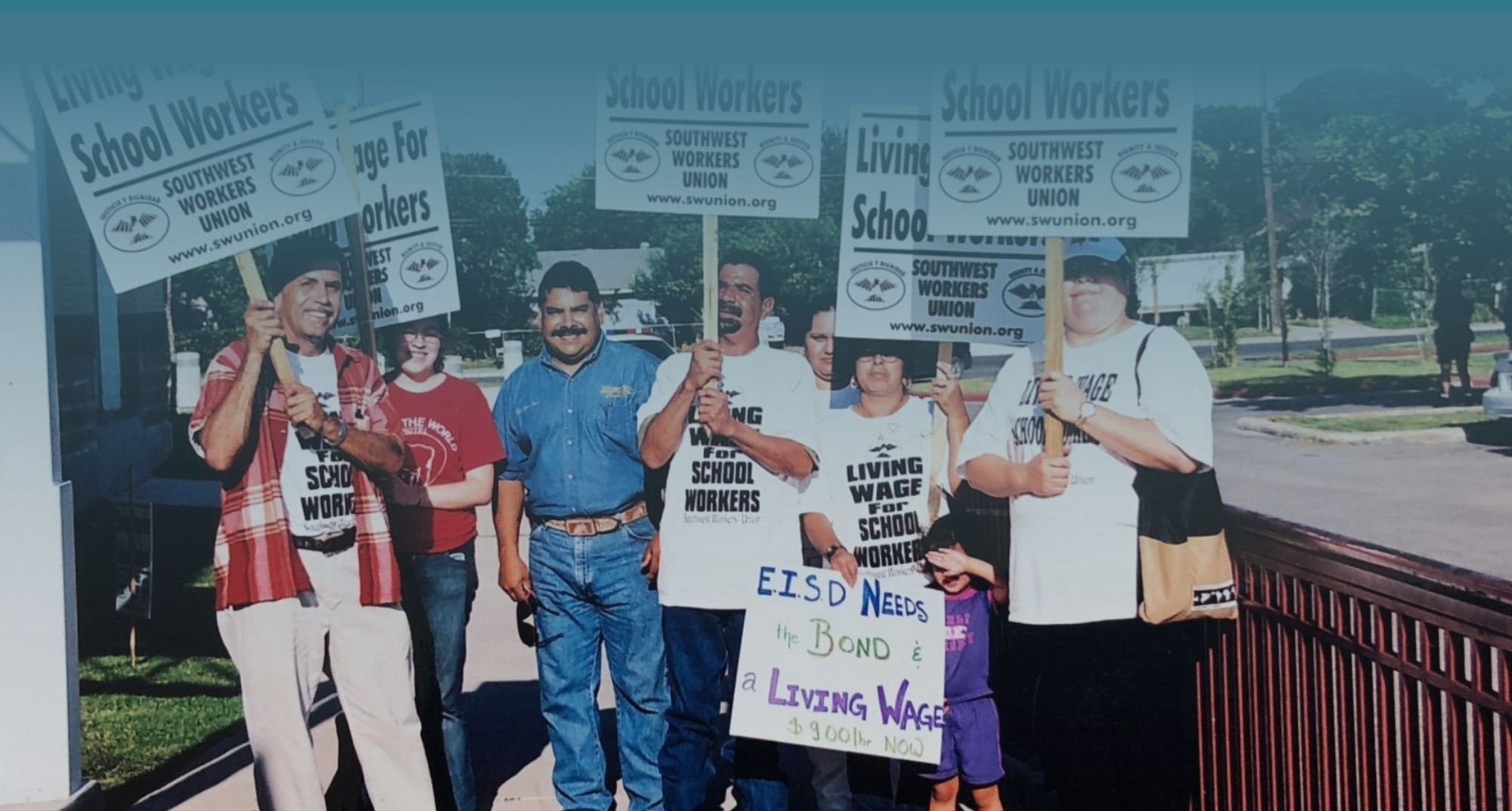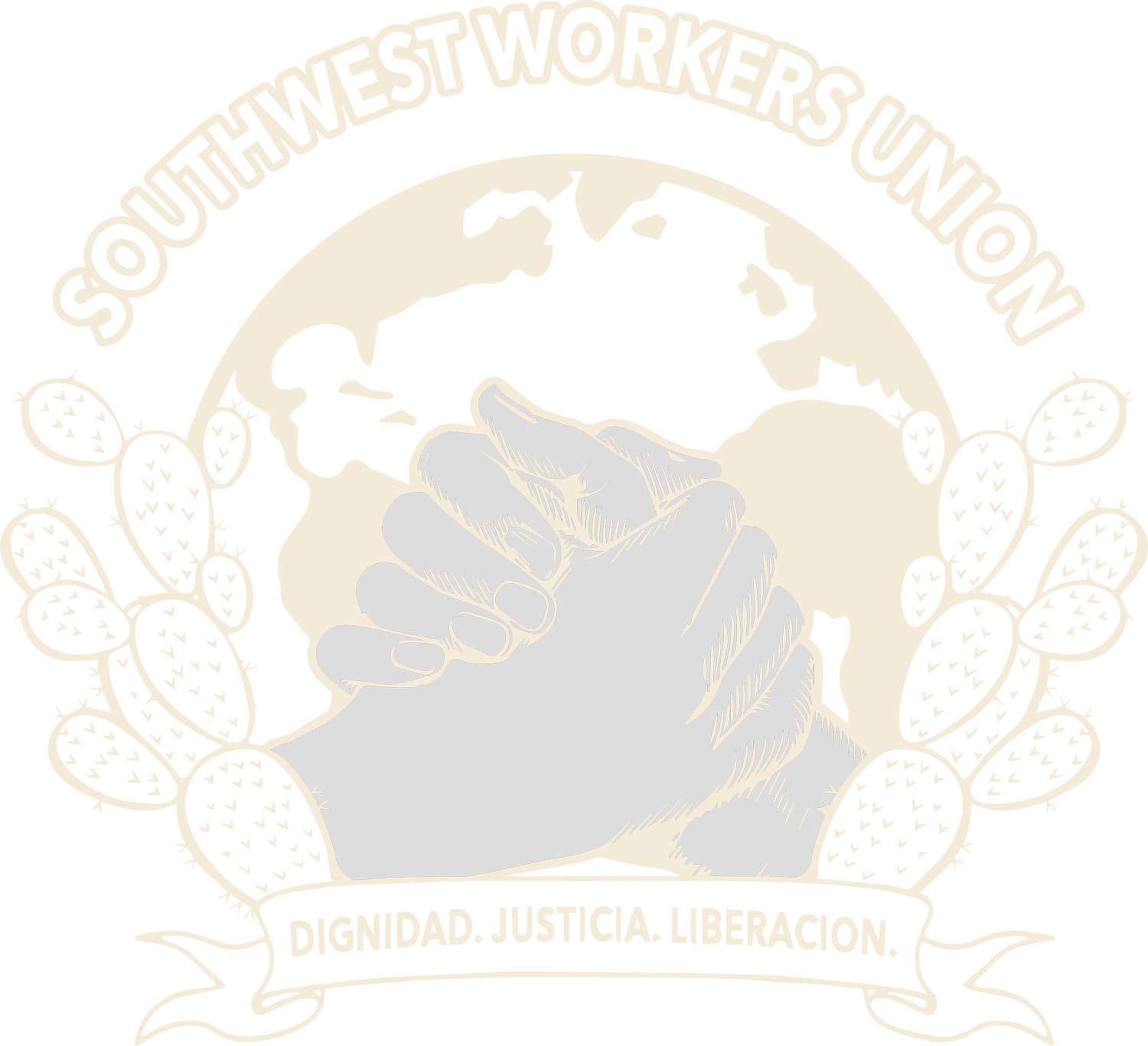
issues
ECONOMIC JUSTICE
Economic justice is more than just earning a living wage. SWU believes that a life free from poverty also requires access to basic rights such as healthcare, a quality education, and healthy and affordable food. However, working communities in South Texas are being forced to make difficult decisions between these necessities. SWU organizes workers and working-class community members to address the personal and collective needs of low-income residents-in their workplace and in their community.
Organizing Public School Workers
SWU organizes its members within the complex political context of South Texas, where residents face the reality of a shrinking public safety net, low-wages, and limited economic advancement opportunities.
In Texas 1 in 5 individuals lives in poverty, while 1 in 4 is uninsured. This is the reality of a state where wages are low and benefits are few.
Furthermore, public sector workers in Texas are subjected to an anti-worker environment created by the Taft-Hartley Act. This legislation, passed in 24 states mainly across the South and Western U.S., marginalizes public workers by denying them the right to collective bargaining.
SWU focuses on organizing classified public school workers-a category that includes bus drivers, cafeteria workers, and janitors-because of their status as the lowest paid public employees in Texas. School workers are often times also residents of the school district and have children in local schools. This lends itself to implementing an intergenerational community-labor strategy to advocate for economic justice and community empowerment in the places we work, learn, and live.
Living Wage & Raise the Wage Victories
SWU’s Living Wage Campaign aims to reestablish the dignity and value of work, demand decent living standards in communities, ensure that families can sustain themselves, reduce the gap in salaries within the school district, and reward workers for years of experience. School workers are parents and community residents, and the pay and benefits they bring home is directly related to the wellbeing of their family and community.
SWU has won two living wage resolutions in the Edgewood (San Antonio, TX) and Donna Independent School Districts (Donna, TX), and incremental steps towards a living wage continue to be won in South San ISD, North East ISD, and San Antonio ISD.
In addition to filing strategic grievances and advocating for better school district policies, SWU engages in state and national policy fights to improve conditions for low-wage workers. SWU has worked with national partners to project the stories of low-wage workers and advocate for wage increases, protections, and assistance programs.
Domestic Workers in Action
Domestic Workers in Action (DWA), is comprised of workers who clean homes and offices, cook, and care for children, the sick, and the elderly.
This predominantly female and immigrant workforce remains an invisible part of the growing service industry that has made local economic development possible for years. Nationally, domestic work is an industry that has been excluded from the National Labor Relations Act and affords few worker protections such as sick days, breaks, workers’ compensation or even at times minimum wage.
Since starting as a local in 2011, DWA’s membership has grown is composed of nearly 100 percent immigrant women. Programs of the DWA have included a popular education approach to leadership development provides skill-based classes in English, computer literacy and workers rights, as well as a political education and history course focusing on colonialism, race, and class in the context of the American South.
Bill of Rights
As a part of the National Domestic Workers Alliance, the Domestic Workers in Action also focus on advocating for immigration reform and have organized several actions targeting Texas Senator John Cornyn and the state legislature in Austin as well as May 1st March for Migrant Rights. Locally, the DWA seeks to pass a resolution of domestic workers in the City of San Antonio. Through this campaign we have meet with local, state and national elected representatives to educate them on the needs of domestic workers and to pass good worker policy.
We highlight the importance of worker and women rights during statewide and congressional campaigns and support voter registration for eligible domestic workers. DWA develops lines of communication and bilingual informational materials targeting domestic workers. This work supports our aim to hold regular education workshops and to outreach to more domestic workers and empower them to overcome the fear of the employer and exercise their worker rights.
Comadre Economies
Comadre Economies is a project based at Southwest Worker’s Union in 2016 in collaboration with our Trabajadoras del Hogar En Accion - Domestic Workers in Action Union while discussing the history of women exploring and creating their own financial systems to sustain themselves and their communities.
These financial models were often created out of a trust between individuals or groups such as a family, partners, cooperatives or close friends. We know this term in spanish speaking circles as a “comadre.” Trust between comadres challenges the larger systems of patriarchy and capitalism that have often left women and LGBTQ persons in the margins to survive solely by the means of their own ingenuity. Historically many
women and queer persons around the world have been integral pieces of market culture, and have helped build up villages and towns with their crafts, textiles and produce among other goods such as services.
The Trabajadoras meet every Saturday 11am to 4 pm in the Women's Worker Center "El Corazon" located at the Southwest Workers Union Campus 1414 E. Commerce. Call 210.299.2666 for appointments or confirmations.
RESOURCES
Comadre Economies Toolkit
Alternative Economies Tool kit. Get the toolkit.→
Get Out the Vote: Gente Guide
A guide on getting out the vote in San Antonio created for the Nuestra Voz workshop series to mobilize voters beyond election day. Get the guide. →
Summer Promotorxs Report
Southwest Workers Union conducted a 3 week blockwalking campign during the summer gathering conversations on how to be address climate action in San Antonio and understand current health issues plaguing the neighborhood.
SWU’s approach to voter engagement is rooted in eliminating barriers through education, leadership development, and advocacy promoting bold cross-cutting politices that support a healthy community development with an emphasis on empowering marginalized groups to build programs that are not only good for the environment but for the economy as well. Learn more. →
Census 2020 x Citizenship
This statement is a response to the United States Census 2020 committee proposal to include a Citizen question for the upcoming census cycle. Further more the City of San Antonio was considering entering in legal action stating a violation to the Civil Rights of Immigrant populations residing in the US. Learn more. →
Get Out the Vote 2012
A report over Nuestra Voz campaign to increase voter turnout in Bexarand Medina Country during th 2012 elections. Hundreas of new voters and members were contacted to ensure they had access to precinct information, rides, and to answer much needed questions around the unconstitutional Texas Voter ID law.
SWU lead a campaign across two counties to ensure communities of color are engaged in holding elected officials accountable. Read the report. →
Statement on Paris Agreement
A statement on San Antonio's involvement in the Paris Agreement created between Fuerza Unida and Southwest Workers Union. Learn more. →
Food Insecurity and the Working Poor
A food policy brief calling on a regional food system that supports healthy, equitable, access, opportunities, oucomes for workers.
The policy brief shares the vision for food justice and how national policy opportunities can create more access for a local food system addressing issues of health, jobs, and fresh food. Read the report. →
People's Freedom Caravan Report USSF 2007
For Southwest Workers Union and many organization in the southern half of the U.S. the social forum was more about the PROCESS of getting there than merely the participation in the event itself. We used this opportunity as a way to build upon the movement in the region and bring grassroots leaders together - young and old - to share their stories, to hear and see first hand the history and the realities in the southern U.S.
Over 500 strong and 8 buses deep with thousands involved along the way, Selma allowed us to continue the dialogue, reflect on their whirlwind of experiences and think about the future. Read the report. →




